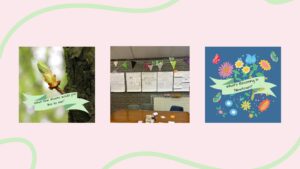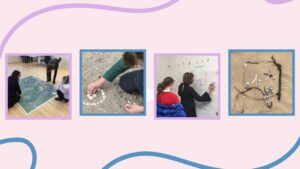Creative Consultations
Carrying out community consultations on behalf of groups and organisations plays an important role in the work of Outside the Box.
We like to take a creative approach to consultations, ensuring they are inclusive and gather the information required. We do this in several ways:
Meeting people where they are
One of the first things we think about is where are the people we want to talk to? We like to make it easy for people, so we go to them, which means we often find ourselves at community lunches, activity groups, on buses, waiting at bus stops or in the local library. We do this as we often find that people are more relaxed when they are in an environment they know and are comfortable in, plus they tend to be with people they know so conversations flow much easier.
Asking different questions
Asking the right questions is key when it comes to consulting with people and communities. Whilst surveys and questionnaires are good and definitely have a place within a consultation process, we believe that you get richer answers speaking to people, asking open questions relevant to the audience in everyday language that people understand in a more positive way, rather than asking “What is missing?” we would ask “What will make it better?” We often use visual prompts or analogies. A favourite analogy is to think of the community as a garden asking questions such as What is blooming? What are the new shoots? And what are your slugs or snails? Using an analogy gives people the opportunity to think more widely and more creatively, we often hear unexpected answers when people are given this opportunity.

Have an activity planned
We find that people tend to tell us more if the questions aren’t the main focus. We therefore like to plan an activity, not something too complicated that needs lots of focus and attention but something relaxing and fun. Some of our go-to activities include outdoor or indoor crafts, campfire building and cooking and new age kurling. Taking time to eat together also gives a good opportunity for conversations.
Incentives to take part
It is important to compensate people for giving up their time to take part in consultations. People lead very busy lives, and we don’t want to add to that therefore we try to think of ways to compensate people which is often by providing food. During consultations with teenagers, we have invited them to pizza afternoons, with other groups we have had afternoon tea or stovies if it is an evening session. In a few instances we have given small vouchers for taking part.
Reaching people who don’t always have the opportunity to respond
When planning your consultation think about the barriers people may face to come along – can everyone get into the building/room and use the facilities? Can people get to it by public transport? Are there childcare needs or language barriers? Any of these will make it difficult to reach the whole community so ensure the building is accessible and think about offering transport, interpreters or childcare if they will encourage people to come along.
We also like to offer people different ways of taking part. Some people simply don’t like to speak out in a group discussion; they will always have the opportunity to write on a post-it, or to respond separately by email, phone call or 1:1 chat. For non-verbal people (or where there are linguistic barriers) we can offer simple visual ways of taking part, including smiling faces or thumbs up.

By implementing some of these tools in recent community consultations, including place making consultations, we have reached some less included groups, especially those who normally wouldn’t have a say. In Eyemouth, by talking to adults with learning disabilities and young parents we were able to hear from a wider audience about the town and what the community thought would make it a better place to live.
“What a wealth of insights from some of the lesser heard voices. I really appreciate the efforts you have gone to, to make the workshops accessible and meaningful to the participants.”
For more information about our consultation work visit Consultation – Outside the Box (otbds.org)
